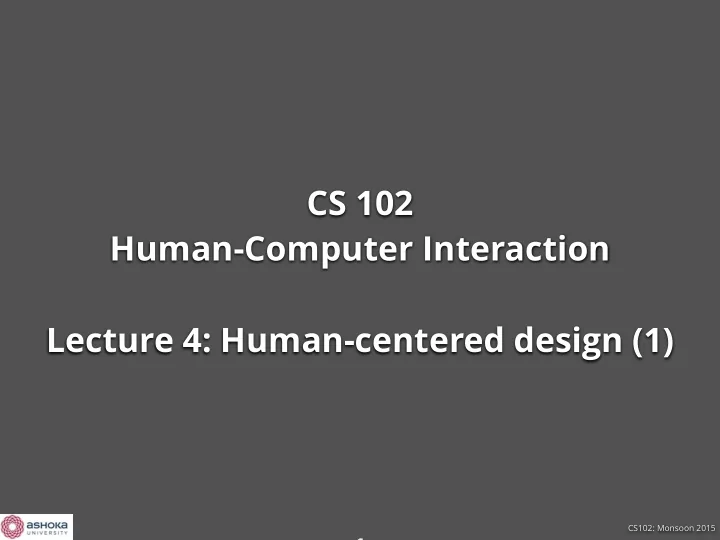

CS 102 Human-Computer Interaction Lecture 4: Human-centered design (1) CS102: Monsoon 2015 1
Administrivia Projects: reminder to post on Moodle Please attend cr0n meetings Any questions on projects? CS102: Monsoon 2015 2
Recap CS102: Monsoon 2015 3
Cognitive biases: summary Understand biases thoroughly Play Bingo (Tambola) to spot them in real life Test your friends Read: Tversky and Kahneman; CIA book on Psychology of Intelligence Analysis See Wikipedia list of cognitive biases — many small variations of the ones we talked about (e.g. what is the IKEA bias?) CS102: Monsoon 2015 4
Human-centered design Human needs, capabilities and behaviors are put fi rst, and then a product is designed to support them 1. Understand user 2. Build prototypes 3. Test Avoid specifying the exact problem too early to avoid narrow framing CS102: Monsoon 2015 5
Human-centered design… NOT What might be some examples? Other foci: cost, bureaucracy, legal liability, lack of interest/ awareness, lack of users, lack of time, manufacturing constraints, keeping people “occupied”, supposedly well-understood users, … CS102: Monsoon 2015 6
Understanding Users Studying and understanding users is one of the most important things HCI designers do Many speci fi c techniques: Surveys Observation Probes Diary/pager studies Interviews Contextual enquiry Ethnographic methods … CS102: Monsoon 2015 7
First: ethical issues 8 CS102: Monsoon 2015
Human-subjects experiments Most “human-subjects” experiments need to be explicitly approved, monitored and reviewed by an Institutional Review Board (IRB) Approval must be obtained before the research takes place Strong policies on consent, deception, etc. The Ashoka IRB form and process is being fi nalized CS102: Monsoon 2015 9
Stanford prison experiment Prof. Philip Zimbardo conducted an (in)famous experiment in 1971: 12 students acting as guards and 12 as prisoners for 2 weeks CS102: Monsoon 2015 10
Other troublesome experiments • Tuskegee syphilis experiment (1932-1972) • Milgram’s “Obedience to Authority” experiment (1961) • Facebook’s emotional contagion (2014) CS102: Monsoon 2015 11
IRB rules IRBs also apply to CS-related work (involving network monitoring, personal/sensitive data, etc.) All students in this class are required to complete human- subjects training IRB not needed or expedited for straightforward projects (surveys, interviews, public observation generally exempt) Ask if in doubt! Be careful about collecting identi fi able information CS102: Monsoon 2015 12 12 Institutional Review Boards and Your Research
Understanding users 13 CS102: Monsoon 2015
Surveys Simplest and cheapest tool to administer (but surprisingly overlooked) Pros: Scalable, quick Cons: Relatively rigid, textual, uni-dimensional Many tools: Surveymonkey, Google forms, etc. CS102: Monsoon 2015 14
Observation Observe participants in their natural settings without any intervention Pros: Ecological validity, can be done with video Cons: Need some physical presence, typically cannot dig deeper CS102: Monsoon 2015 15
Probes Alter the environment in some way and see how people react to it. e.g, Google Fibre, free phones, … Pros: Simulate a possible future Cons: Expensive, perturbs the environment, limited use CS102: Monsoon 2015 16
Diary studies Participants record “incidents” as they happen. Researcher is generally remote Incidents could be gathered either automatically or manually For each incident, participant either answers some questions (feedback method) or is interviewed (elicitation method) CS102: Monsoon 2015 17
Diary studies Could also capture some information right away to aid memory and fi ll in the rest later Tips: Recruit more users than needed (some will drop-out) Check mid-way to ensure that data is being collected CS102: Monsoon 2015 18
Diary studies Pros: Reliable way to get longitudinal feedback Cons: Might be intrusive, low control, might have dropouts You can use this to observe yourself! CS102: Monsoon 2015 19
Diary study example CS102: Monsoon 2015 20 http://www.eouchpaindiary.ca/
Related methods Experience Sampling Method (ESM or pager study) periodically interrupts participants and asks them to record something (e.g. emotions) Daily Reconstruction Method (DRM) tells participants to reconstruct all episodes from the previous day (typically ~15/day) and emotion about each of them fi nds that life circumstances have little e ff ect on daily satisfaction improved life circumstances quickly cease to provide increased satisfaction (“hedonic treadmill”) CS102: Monsoon 2015 21 http://www.sciencemag.org/content/306/5702/1776.long
Ethnography Eesha Thacker CS102: Monsoon 2015 22
ἄ νθρωπος - λόγος ánthr ō pos (human) - lógos (study) • Renaissance Germany (mid 15th century to early 17th century) Magnus Hundt (1439 - 1519) - Philosopher, Physician, Theologian Otto Casmann (1562 - 1607) - Humanist • Charles Darwin (1809 - 1882) 1854 - Origin of the Species 1855 - Theory of ‘ natural selection ’ CS102: Monsoon 2015 23
Fields • Sociocultural - describes the workings of societies around the world • Biological - concerns longterm development of the human organism • Linguistic - investigates the in fl uence of language in social life • Archaeological - studies past human cultures through investigation of physical evidence CS102: Monsoon 2015 24
ἔ θνος - γράφω ethnos (folk, people, nation) - grapho (I write) CS102: Monsoon 2015 25
Autoethnography • As a discipline can shed new perspective on current word issues • From indigeneity to migration and material cultural • Re fl ect on our own perspective when thinking about ‘issues’ • How we all engage with di ff erence and sameness on a daily basis CS102: Monsoon 2015 26
CS102: Monsoon 2015 27
CS102: Monsoon 2015 28
CS102: Monsoon 2015 29
CS102: Monsoon 2015 30
CS102: Monsoon 2015 31
CS102: Monsoon 2015 32
CS102: Monsoon 2015 33
CS102: Monsoon 2015 34
CS102: Monsoon 2015 35
CS102: Monsoon 2015 36
CS102: Monsoon 2015 37
Recommend
More recommend